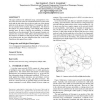Free Online Productivity Tools
i2Speak
i2Symbol
i2OCR
iTex2Img
iWeb2Print
iWeb2Shot
i2Type
iPdf2Split
iPdf2Merge
i2Bopomofo
i2Arabic
i2Style
i2Image
i2PDF
iLatex2Rtf
Sci2ools
96
Voted
IWCMC
2009
ACM
2009
ACM
Energy penalties for non-shortest paths in wireless sensor networks with link failures
This paper addresses the additional energy consumption in wireless sensor networks where the communication between the sensor nodes and the sink nodes does not always make use of the shortest path, due to the presence of link failures. For simplicity, link failures are assumed to be stochastic and independent. The basis for the analysis is a planned topology, with multiple sinks deployed spatially apart, in order to optimise the probability of reporting sensed data over the shortest path. The extra amount of energy consumed by the occurrence of link failures and transmission errors is then analysed. In addition to analysing the steady-state availability of the shortest path, the time dependent behaviour is also found. Simulations also support these results. Categories and Subject Descriptors C.2.1 [Computer-Communications Network ]: Network Architecture and Design—Wireless communication General Terms Performance, Reliability Keywords Wireless sensor network, energy consumption, mult...
Related Content
| Added | 28 May 2010 |
| Updated | 28 May 2010 |
| Type | Conference |
| Year | 2009 |
| Where | IWCMC |
| Authors | Geir Egeland, Paal E. Engelstad |
Comments (0)

